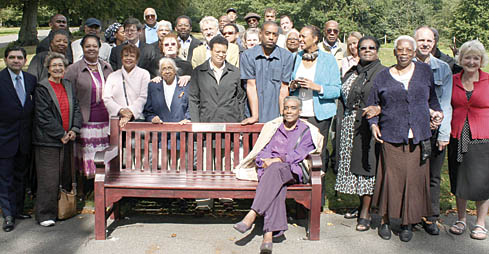|
|
 |
| |

Corinne Carter sits at the Waterlow Park bench in memory of Trevor surrounded by friends and family |
The Bull, a man who got things done
Bench dedicated to memory of teacher who was inspirational figure to West Indian families
WHO is Trevor Carter? Why does the nameplate on the new teak bench in his memory at Waterlow Park, Highgate, refer to him as “The Bull”?
His life was revealed in speeches by Alysoun Whitton, parish reader at St Augustine’s Church, Archway, Islington North Labour MP Jeremy Corbyn and educationalist Professor Gus John at a ceremony attended by friends and family in the park on Friday morning.
Born in Trinidad, Trevor came to Highgate in the mid-50s, worked as a teacher in north London, and became an active member first of the Communist Party then the local Labour Party. Before the end of his 76 years, he turned back to the church and the religious beliefs of his youth in the West Indies, and helped clergy at St Augustine’s Church.
But why “The Bull”? His widow, Corinne, told me that had been the nickname given by the three or four families from Trinidad who shared a large house in Cromwell Avenue, Highgate, after their arrival in London in 1956.
To them, Trevor was a man who got things done, a man who would challenge, with charm and insistence, any form of authority in the pursuit of justice and fairness, a man who could be like a bull!
Jeremy Corbyn praised Trevor as a teacher pupils and parents loved, his name a by-word in the community – particularly among Caribbean families – as an inspirational figure.
From Patsy Downer, a representative of the governing party in Guyana, came a thank-you speech for the work Trevor had done in helping today’s governing party of the former colony in South America and Cheddi Jagan, the “revered” champion of liberation.
Professor Gus John remembered Trevor’s “selfless and caring” guidance to young people as an educator, his reputation as a leading figure among Caribbeans in London, a man who helped start up the Notting Hill Carnival, a friend of all new West Indian arrivals in the capital.
Too many young people today in the black community, lamented Prof John, had no sense of their own history – and Trevor would patiently explain their past, from slavery and colonialism until today, hoping to guide them to a place in modern society.
Afterwards, at a buffet at the family home in Archway, memories were shared about “The Bull”, and it occurred to me that, whatever the reasons that pulled Trevor back to the church in his last years, it was probably more than an accident that he found a home in St Augustine’s, named, presumably, after the great African philosopher St Augustine of Hippo, whose teachings have influenced Christian believers for so many centuries. |
 |
|
|
 |
| |
| |
|
 |
|